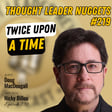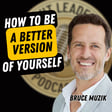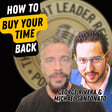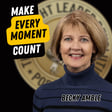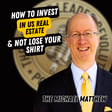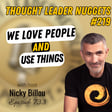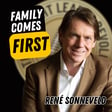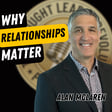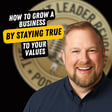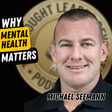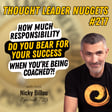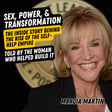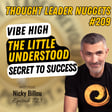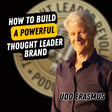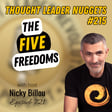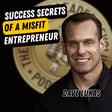Become a Creator today!Start creating today - Share your story with the world!
Start for free
00:00:00
00:00:01

EP121: Phelim McAleer - How To Successfully Crowdfund Your Business Or Project
Our guest, Phelim McAleer, who is a documentary film director and producer, has succeeded in raising money from five separate crowdfunding campaigns for his controversial Kermit Gosnell film project. But before he got there, he and his documentary film partner and wife, Ann McElhinney, encountered resistance from Kickstarter, a global crowdfunding platform, which censored the project from their website and anticipated a lack of interest from the media. They immediately kicked back and switched to Indiegogo. They took it seriously then proved themselves and sold the film by utilizing social media, word-of-mouth, and reaching out to non-media influencers to garner support for the film. Their creation quickly became the highest-funded crowdfunding project of all time. During this interview, you’ll learn about…
- Prove yourself with facts and figures
- Move your ideas to something that is not well covered
- Use every possible ways to reach out to everyone
Transcript
Environmentalists vs. Villagers: Culture or Poverty?
00:00:00
Speaker
And there's this tendency of environmentalists to look at a mud hut village and see culture, whereas people who live in the mud huts see poverty all around them, and they want the brick houses, they want the concrete houses. If you build a concrete house there, the environmentalists will call it the destruction of culture. Poverty is not a culture. Poverty is a curse.
Introduction to Thought Leader Revolution
00:00:23
Speaker
Welcome to the Thought Leader Revolution with Nikki Ballou. Join the revolution. There's never been a better time in history to speak your truth, find your freedom, and make your fortune. Each week, we interview the world's top thought leaders and learn the secrets of how they built a six to seven-figure practice. This episode has been brought to you by eCircleAcademy.com, the proven system to add six to seven figures a year to your thought leader practice.
00:00:54
Speaker
Welcome to another exciting episode of the podcast, The Thought Leader Revolution. I'm your host, Nicky Baloo. And boy, do we have an amazing and exciting guest lined up for you today.
Meet Phelim McAller: Controversial Storyteller
00:01:07
Speaker
He and his wife are two of the most courageous thought leaders out in the world today.
00:01:13
Speaker
extremely controversial and taboo subjects. They turn them into documentaries and even dramatic movies. They write best-selling books about them and they educate the world. In a way, they're almost the conscience of the world today in 2018. I am speaking, of course, of none other than the one, the only, the legendary, Phelan McAller. Welcome to the show, Phelan.
00:01:36
Speaker
Thanks for having me on. It's a pleasure to be on your show. Really, it's a pleasure to have you. So, Felim, our listener is someone who is either a thought leader or an aspiring thought leader. That means that it's very important for them to understand from our guests, from the experts that we bring on, you know, how that is that they got to be the thought leaders that they are. So why don't you give us your backstory? Our listener wants to know. Yeah. Backstory. I suppose that
Development vs. Conservation: A Transylvanian Tale
00:02:06
Speaker
It's hard to believe that I have a backstory, but I suppose I do. I was an average journalist working for newspapers. I went to a European journalist, went to the Financial Times, went to cover Eastern Europe for them, Romania, Bulgaria, the Republic of Moldova, and did the usual journalism. What happened was there was a story about a gold mine opening up in Transylvania.
00:02:33
Speaker
It was the usual story of an evil mining company, Canadian mining company, coming to destroy the village, destroy people, pollute, rape the village, the usual. I went up there and I remember I got up with my wife on the train and it was in Transylvania, believe it or not. This actually exists. The only thing we were working on was how to get bloodsucker and vampire into the headline to describe the mining company. We got up there.
00:02:59
Speaker
The mining company were going to destroy the village, correct? But they were going to build a model village for people with houses a couple of miles away. So they built this model house in the middle of the village. And we walked into the model house, which is kind of a Swiss chalet thing. And there was a woman standing in the middle of the room, an 86-year-old woman crying. And my wife gets out her microphone and goes, oh, great, a victim. Excellent. Because that's what journalists do when they see a victim, they don't have to start doing it. You think there's a story? Oh, my god, a victim.
00:03:29
Speaker
Why are you crying? Why are you crying? Because of the evil mining company. And the woman said, I'm crying because I hope I live long enough to live in a house like this. Wow. And, and you know what you never did because of two environmentalists, two foreign environmentalists stopped that mining project. You know, and, you know, you as a journalist, you can then say, well, well, whose story are you going to tell?
Who Should Be Accountable: Environmentalists or Companies?
00:03:55
Speaker
Are you going to tell the story from the foreign environmentalists?
00:03:59
Speaker
The way they found out is full of exaggeration, misrepresentation, and lies. Or you can tell the story about the people who live in the village who've been mining there for 2,000 years, whose place is polluted because of communist mining practices, and the Canadian mining company is going to clean it up. And there's this sort of tendency in journalism, he said, she said, but when we looked at the facts, what the company was saying was true, what the environmentalists were saying was incorrect,
00:04:28
Speaker
factually. And the thing is, if an environmentalist lies, they raise more money, because they can panic people. If a company CEO lies, he can go to jail, he can be bankrupted, this company can be closed to share a price or tank, all these things can happen. But there's no accountability on the international environmental movement. As journalists, you have to make people accountable. And so then I decided, you know, let's poke this bear, let's see what gets
Activists vs. Development: The Stories of Locals
00:04:54
Speaker
him. And, you know, I remember at the time thinking, as I discovered,
00:04:58
Speaker
But the enemies of the world's poor actually very often was not big business. It was big environment. It was stopping development projects. I remember uncovering this going, this is great. Wow. I was making a documentary. This is great. No one's done this before. The laughs are going to love this. This is going to provoke discussion and debate and really force people to think again and cause internal arguments and all.
00:05:26
Speaker
Boy, was I disappointed. We were giving voice to real poor people in real areas, not activists, not paid activists, not environmentalists, not rich kids from foreign countries, not rich kids from the home countries either, but actual people who lived in these villages, who wanted development, who wanted jobs with computers and trucks and digging equipment and microchips and wanted a better life for their children.
00:05:53
Speaker
There's this tendency of environmentalists to look at a mud hut village and see culture, whereas people who live in the mud huts see poverty all around them and they want the brick houses, they want the concrete houses. If you build a concrete house there, the environmentalists will call it the destruction of culture. Poverty is not a culture, poverty is a curse. I decided then that was the story that I was going to tell. I thought at the time that the left
00:06:22
Speaker
would embrace that story and have serious questions with itself. Yeah, unfortunately, that wasn't true. Unfortunately, the modern left, I think, has been hijacked by an extreme Marxist, crypto-fascist element that brooks no dissent. And they're using tactics that were used by Stalin and Hitler back in the day. But I mean, that's not the primary purpose of our discussion today. But sadly, that's true. They're not interested in helping people. They're interested in power and control.
00:06:51
Speaker
I didn't know that at the time, actually. I honestly thought that they were interested in helping people. I really did. It took quite a shock to me when I said, look, here's the evidence that you're not helping people. You must be interested in this. This is quite good. I mean, this is interesting. You're genuinely interested in helping people. Let's talk about how you can actually help people. Is there a way to help people and still have the mind? Is there anything they can do?
00:07:21
Speaker
I suddenly realized they're not interested in one bit in a factory or a mine or anything. They want to stop industrialization. They want to stop development. Then you have to ask, why? If the company could come along and say, we're going to clean up the village, and as the company was obliged to spend money to clean up old-style pollution from the commonly used area, that didn't happen because of environmentalists. People are living in polluted environments now.
00:07:50
Speaker
because of the environmental movement.
Comfort in Controversy: From Northern Ireland to Global Issues
00:07:53
Speaker
So your courage in speaking truth to power and getting messages like this out is what really put you on the map, is what had you stand out. One of my mentors is a fellow from Australia named Matt Church, and he says, an expert, someone who knows something, a thought leader, someone who's known for knowing something. You and your wife, Anne, you guys are known for taking on controversial subjects.
00:08:18
Speaker
subjects that in this day and age, a lot of conventional journalists and traditional mainstream, so-called mainstream outlets won't take on. You take them on and you bring them to light. So what has had you continue to do this, Felim? Well, you know, maybe stupidity, you know? Maybe craziness. I think it's party. I'm from Northern Ireland, right? I grew up during the troubles. I couldn't tell. You sound Italian to me.
00:08:47
Speaker
Yes, I tell people I'm from Idaho and I got this accent from a Hollywood voice coach. Some people believe me as well. You're a man after me on hard serve. I'm from Northern Ireland and I grew up with conflict and maybe I'm used to conflict, maybe it's where I feel comfortable. It's very easy to be the loudest voice in the room.
00:09:14
Speaker
This idea, Hollywood says, we love controversy. What they're really saying is, we love our own opinions shouted back to us in a really loud voice like Michael Moore. It's like, that's not controversy. That's just people telling you what you want to hear. Controversy is being at a dinner party,
00:09:37
Speaker
and three people hating you for your opinions. And two, thinking about it. And one, at the end, keeping quiet because they always thought about it. They always thought that anyway. But we're afraid to say, I didn't want to be that journalist that was a reliable player on the team. And that would report the story as they wanted reported. Wow.
00:10:01
Speaker
So, you decided to take on these incredibly controversial subjects that have brought a lot of opprobrium on your head. Let's face it, people in your industry don't typically like having their sacred cows slaughtered. And that's exactly what you've done. You've slaughtered a lot of sacred cows.
00:10:21
Speaker
having done this in this instance, you know, walk us through how you've arrived where you are today with this incredible movie that you and your wife have brought to life about America's most prolific serial killer.
The Gosnell Case: America's Hidden Horror
00:10:36
Speaker
And it's a story that almost nobody knows because the traditional mainstream media outlets have decided not to cover it. Yeah, I mean, I made a documentary about fracking, you know, questioning the conventional wisdom that fracking is this evil.
00:10:51
Speaker
evil thing. I want the scientific facts. When you look at the scientific facts, there's nothing really there. That's the thing. There's lots of allegations and lots of lawsuits and lots of anecdotes, but facts about pollution from fracking, very limited, very limited. Fracking is big in Pennsylvania. I happen to be in Pennsylvania for a screen. I had a couple of days off and I read in the local paper in Philadelphia about this
00:11:18
Speaker
this court case going on, the Kermit Gosnell case, and I went down and I went into the courtroom. It was a massive courtroom. The prosecution had hired the biggest courtroom in the area because of the massive media interest in America's biggest serial killer. I saw pictures that were, in my 25 years as an investigative journalist, I never saw the like. Then I also heard evidence I'd never heard the like before.
00:11:47
Speaker
I saw Kermit Gosnell, America's biggest serial killer sitting a few feet away from me. But actually the most shocking thing of all, the most shocking thing of all was behind me. It was the empty press benches. There was no national journalists, no mainstream journalists, just some local reporters. That to me is shocking. That to me was unacceptable. And it's also, by the way, for people out there who are thought leaders, it was an opportunity as well.
00:12:17
Speaker
If you're sitting there and your jaw is hitting the floor in shock at what you're hearing, and no one else is hearing it, and no one else is reporting it, that's an opportunity. If you're shocked by something, but it's not getting out there, you're sure everyone else is going to be shocked by it. It was a real problem for the prosecution, actually, because the jury were going home hearing this incredible evidence going home, and it wasn't in the mainstream media.
00:12:42
Speaker
And if it's not in the mainstream media, is it real? Does it really happen? So don't be fooled by the media not covering something. If you're shocked or moved by something, then let's get it out there and run with it because that's an opportunity, not a problem.
00:13:03
Speaker
Let's talk about this a little bit from the business end of things, shall we? It's a powerful point that you just made. So I have a client in my program. So I have a program that helps people who are thought leaders basically position themselves as the go-to thought leader in their space and monetize it
Success Through Niche Markets: A Fitness Trainer's Story
00:13:21
Speaker
in a powerful way. So I have a client of mine.
00:13:23
Speaker
And he was in the personal fitness space. So he was a trainer when I met him. He was 25 years old, barely had two pennies to rub together, didn't have enough clients. He started working with us and we started positioning him. And he tried a couple of different niches, if you will, or niches, as we say here in Canada. And they didn't work.
00:13:44
Speaker
And then he met a guy who was a Paralympian. His leg had been cut off when he was a child, and he'd won some medals at the Paralympic Games. And an idea went off in his head. He said, you know what? Nobody's trying to help people with missing limbs work out. What if I put a workout program together for them?
00:14:06
Speaker
this was a genius idea on his part because as soon as he did that, he went from like less than 20 clients to over 400, almost overnight, right? He didn't have the wherewithal to be able to take on all the new business that he had. He went from making
00:14:24
Speaker
$20,000 a year less than that, to this year he's going to do almost $3.5 million. He's 29 years old right now. He's a kid. He's single. God bless him. He's got all this money coming in. But I'll tell you why he won. He won because
00:14:40
Speaker
people with missing limbs had nobody serving them when it came to their health and fitness. It was almost like the message was, you're damaged, there's nothing you can do, so, you know, don't bother working out. And this young man, Dan Niskers, his name, his message was, you're not damaged, you're a badass, you're a warrior, and I'm gonna turn you into one again. And that affected them not only on the physical plane, but also emotionally and intellectually. And they really bought into his message, you know what I mean? And so,
00:15:09
Speaker
He became the go-to guy. This guy makes more money than any trainer in North America who's not coaching a mega Hollywood star. Think about that, right? And he's a 29-year-old kid here in Toronto.
00:15:23
Speaker
You know, and essentially what you're saying is that if no one is going after what you're going after, that's a good thing. Because that means there's an underserved market for your message. And your message here is that there are certain stories that the mainstream media doesn't want to cover. And there are audiences hungry for those stories. So I'm going to cover them. And lo and behold, you've had these hyper successful platforms.
00:15:52
Speaker
movies, books, and now a movie that's like going to be in like 700 theaters across the United States. And by the way, is it going to be in Canada as well? Not yet. Not yet. If it's successful in the United States, yeah, we'll be expanding to Canada. So that's the thing. We need people. I don't know when this podcast will air. Hopefully, hopefully it'll air soon. I'll make sure of it. Yeah.
00:16:15
Speaker
It's important to have a big bang opening weekend and the next weekend, big bang. Hollywood pays attention. You can go outside the mainstream, but at the end of the day, you have to work within the mainstream. You have to prove yourself with figures, facts and figures. For example, this movie, obviously, Hollywood wouldn't fund it. We went crowd funding. Kickstarter rejected us, wouldn't let us on. We went to Indiegogo.
00:16:43
Speaker
We raised $2.3 million from 30,000 people. Now, that shows you there's a hunger out there. There's an appetite out there for this story.
Crowdfunding: Engaging and Empowering Audiences
00:16:55
Speaker
But that's a massive base of people that we can then leverage for our next project.
00:17:00
Speaker
You know, and I would say that to thought leaders is, you know, I mean, there was all these people out there demanding this kind of content. It wasn't being provided. They give us two point three million dollars to do it. When we started off, there was no crowdfunding. We started making the environmental documentaries. There was no crowdfunding. We had to get investors and people like that. Now it's just now we're now crowdfunding has opened all these platforms. So I would say to people, you know, if you're shocked, if you're if you're shocked by something, if you're
00:17:30
Speaker
That's interesting. Nobody's doing that. Try crowdfunding, but don't take crowdfunding seriously. Just because you know it's a great story doesn't mean everyone else will get it. You have to prove it. You have to go out there and sell it. I see a lot of people in crowdfunding failing. I think more crowdfunding projects fail and succeed. It's because people don't believe they have to do the work.
00:17:56
Speaker
because the story, the idea is so good, and there are a lot of good ideas out there. But, you know, unfortunately, it's not enough. It's not enough. And I think, you know, just to almost go back again, we were Irish living in Romania. We made a documentary called Man Your Own Business that was hugely successful in America. And I remember coming to America the first time, and it was a movie attacking the environmental movement, which no one had really done before. And I remember speaking to this very senior journalist, and he goes,
00:18:24
Speaker
I have friends who've wanted to make this documentary for 10 years, but they're worried about their careers. You made it because you live in Romania, and you don't care about your career. He was right. We didn't realize what we were doing. We didn't realize we were poking a bear. We thought we were just telling a great story, and we were. Then we realized, well, we might as well keep going because this is a great story, and there's so many layers to it. There's a lot of points in there.
00:18:54
Speaker
You need to follow, if you're shocked by something, you need to go with it. And don't forget crowdfunding. Now, crowdfunding is very powerful. There's no question about it. But the point you made here about you can't just expect people to come running to you is a very important one. We say in thought leadership that your number one job is your problem solver.
00:19:17
Speaker
You're solving a problem. You're scratching an itch. You're solving a wound. And essentially, Phelan, that's what you and your wife have done with this upcoming movie and all the movies that
Ignored Stories: Building a Reputation for Truth
00:19:28
Speaker
you've done. There is an itch that wants to be scratched, and that itch is there's tons of people in the Western world today who feel that the mainstream media is
00:19:38
Speaker
not their friend, you know, is not giving them the full truth and they want to know the truth. We live in an age where people are hungering for authenticity. People are hungering for transparency. So you scratch that itch and people have said, yes, this man is scratching our itch. He and his wife, they get it. We are going
00:19:58
Speaker
to buy their books, watch their movies and tell people about them. Essentially, you have taken a level 10 pain of people, people that are hurting and suffering because they're not being told the truth and they don't know who to trust. And you're giving them something that says, hey, you can trust us. We're going to tell you the truth.
00:20:14
Speaker
We're going to actually take on the shibboleths. We're going to take on the sacred cows. We're going to bring you the God's honest, unvarnished truth. That as a thought leader is called being commercially smart because I am 100% certain that this movie that's coming out this
00:20:31
Speaker
this weekend is going to be a massive success. It's going to be one of the biggest movies of the year. And given the fact that you haven't had to go through the traditional Hollywood spending machine to get it out there, it's going to be a very profitable one for you as well. So A, it's going to get the attention of some people in the industry who go, you know what, maybe we ought to take a look at this.
00:20:51
Speaker
But B, more importantly, it's going to continue to build your thought leadership and your brand as a truth teller or someone who tells truth to power. I think this is very powerful. I don't know if you did this deliberately or not, but it was brilliant, brilliant work. Well, thank you. Thank you. You know, I mean, I wonder what Hollywood think again. I mean, this is going to mean why isn't Hollywood getting its stars to crowdfund movies?
00:21:17
Speaker
and even giving the crowd funders money back on their investment. You can do that now, equity crowd funding. Why isn't Hollywood saying, listen, you fund part of this movie and you get a share of the profits back. I mean, we've got 30,000 people who funded this movie. They're all going to go out on opening weekend. They're all going to bring their friends. For sure. This is a massive audience. Why isn't Hollywood tapping into that, creating fan bases?
00:21:46
Speaker
working with those fan mixes. Thankfully, they're not because we are. We're doing this. We think the Gosnell movie is going to be hugely successful this weekend and next weekend. The reason is because there's an appetite out there. People are tired of the cover-ups. People are tired of the mainstream media not covering stories. Thankfully, they've built up a real appetite and we're just so happy.
00:22:13
Speaker
to fill that gap. I am thrilled beyond words to have you on my show. I mean, it's a true honor because what you're doing is important. You are helping to make sure that more and more people know the story of what happened here so that it can't happen again, you know? Evil grows in darkness.
00:22:42
Speaker
And you are shedding a light on that darkness, my friend. Kudos to you and kudos to your wife, Ann. Bravo. Thank you. Thank you so much. My pleasure. So, tell us a little bit about the movie.
The Gosnell Movie: Politics, Law, and Justice
00:22:54
Speaker
Oh, yeah, the movie. We need to talk about the movie. Well, you know, the movie is, first of all, it's PG-13. I want to emphasize that.
00:23:03
Speaker
You've seen the movie, have you? I've seen a trailer for it. I haven't seen the movie itself yet, my friend. I'm looking forward to seeing it. If you can have one word when we're done with the interview, tell me how I can see it. And Jenna, it'd be great. Yeah. So the trailer is very much like the movie. You know, it's a PG-13. It's about America's biggest serial killer. So he's an abortion doctor, Gosnell, living in Philadelphia. And he murdered many of his patients. He murdered
00:23:31
Speaker
many children born alive stabbed them to death as, you know, these were viable human beings. The grand jury thought he'd get hundreds, perhaps thousands in a 30-year killing spree, and he was allowed to keep killing even though the bodies were literally piling up because the politicians didn't want to restrict abortion. And it all started, actually, funny enough, with a Republican governor
00:23:56
Speaker
Up until Republican Governor Tom Ridge in Pennsylvania, abortion clinics had to be inspected every year. He got in an approach choice ticket and said, oh, no, that law that says every year doesn't really mean every year. You don't have to go in and inspect them. So they didn't go in and inspect them. And he was allowed to keep killing and kill and kill and kill on hindered. And it was only he was only caught because he started selling opioids, opioid prescriptions.
00:24:24
Speaker
And the DEA got involved and a local cop, Jim Wood, he got involved. And he was the one who realized there's something not going on here that's not right. So it's about his investigation and the political opposition he faced. And then the difficulties of trying an abortion doctor for murder in a political atmosphere like that. And also where people don't really know much about abortion and where, you know, what's right and what's wrong, what's legal and what's not is a gray area.
00:24:54
Speaker
And so that's... But he had babies born alive and then he would kill them, right? I mean, this was not even your conventional abortion. He would induce labor, baby would come out, then he'd kill the baby. Yeah, that's correct. I mean, that is not an abortion. That is plain and simple murder. Yeah, but see then, the prosecution messed up because they brought in professional abortion doctors to describe what a good abortion is, what a legal abortion is.
00:25:22
Speaker
And eventually the defense forced them to admit, you know, what happens if a baby is accidentally born alive? And she said, well, it wouldn't happen. But it can happen. Yeah, it can happen. What happens? Well, we give it comfort care, right? This is from the transcript and it's in the movie. I saw that in the clip on your interview this weekend. And the doctor said, and the lawyer said, what's comfort care? And you can see all these journalists in the courtroom going, do you know what comfort care? I don't know what comfort care. What's comfort care?
00:25:51
Speaker
And she said, comfort care, we would put the baby aside, cover it with a blanket, keep it warm. Eventually it will pass. And, you know, when you think about it, that's murder. Well, I mean, no, it's not under the law. That's legal. Right. That's insane. His babies were born alive and he was starving of death. That's murder. Letting the baby die of dehydration and hunger is you get medical
00:26:17
Speaker
The license is for that. You get money for that. That's part of your job. So the jury had a real problem working that one out. Now, in the end, they decided what Gosnell did was murder, but they also felt that there needs to be changes in abortion law as well. Wow. I have no words.
00:26:42
Speaker
It's horrifying what happened here, but it's an important story. You've told it. Now, you have some pretty big stars that are part of this movie, people like Dean Kane and Nick Circe. Yeah. Nick directed it brilliantly. Dean is fantastic in that scene. Dean has the all really great advantage of being a really nice guy. He's a super nice guy, so a pleasure to work with. He was young super man, right?
00:27:09
Speaker
He was young superman, but he's a really nice guy. Funny, I think being talented is great in Hollywood, but being really nice is helpful too, because you're spending 16 hours a day for three months with someone. It's nice if they're nice, you know? And Dean is. And look at Errol Billions, who plays Gosnell. He's super creepy. And Michael Beach, you might know Michael Beach, Sons of Anarchy. Yeah, yeah, yeah. That's a great show.
00:27:37
Speaker
Yeah. So, you know, we've got some great guys in it. Sarah Jane Morris, who plays the district attorney, a conflicted district attorney. So, you know, it's a, I know I actually know her personally. That's amazing. Isn't she from Vancouver originally? Sarah Jane Morris. No, no. Then I've got to confuse with someone else. Okay. Okay. Maybe she is. Maybe she is, you know, I actually, I don't, yeah, actually funny enough, she has an international background.
00:28:03
Speaker
I know her parents live in Texas now, but she may have an international background, so you may be telling me the right person.
00:28:10
Speaker
Uncle, look up my old emails. That'd be too funny if they're the same person. That's amazing. So you've got this movie. It's opening this weekend. It's in 700 movie theaters. So if you're listening to this, this is a powerful movie. It's a movie that almost didn't get made. And this brave and courageous man and his brave and courageous wife wrote a book that was a New York Times and Amazon bestseller. And it deserves your support. Go check it out.
00:28:38
Speaker
If you've learned anything from Phelum and what he's done throughout his career, it's be willing to go where other people aren't and do the work. Do the work to help people see what value you can bring to them. Am I right about this? Yeah, do the work is important, funny enough. It's not enough to have the great new idea on that. You actually have to do the work, right? It's a compatible world out there for new ideas and you can have a new idea
00:29:08
Speaker
But you need to push it, you know, and you need to get it out there. And, you know, we're not pro-life activists. And people have said to us, you know, in our movie, you know, somebody said, thank God it's not another crap conservative movie. Right. And, you know, because it's not it's a proper movie. And, you know, we didn't come into this as pro-life activists. So we're not pro-life activists. So and I think that meant we made a movie rather than a political statement.
00:29:36
Speaker
which is always more entertaining. And I suppose that's what I'd say to the people out there who thought that you may be involved in an area, right? Because you can take your ideas and principles and move it slightly off the center of your foot. It's a bit like that trainer guy, you know? He was trying new ways of training people, training people in U.S. This and that, you know, it wasn't working. He just moved slightly away
00:30:00
Speaker
training people with missing limbs and suddenly became successful because he was applying the principles he'd worked so hard on on the mainstream to this niche group and that became a roaring success. So if you're working at something that's pretty mainstream and you have certain principles and cores and thought ideas and thought leader ideas, move a little and apply them to something else that's not as well covered and that may be your way forward.
00:30:39
Speaker
How can people find out where to go see the movie? There's
Call to Action: Support the Gosnell Movie
00:30:42
Speaker
a website, right? Is it gosnellmovie.com? That's the one. OK. And there are 700 theaters in the United States that are carrying the movie. So if you're in the United States and listening to this, go to gosnellmovie.com, find out where it's playing that's close to you, and make sure you go see it. And definitely go to Amazon and buy the book, Gosnell, The Story of America's Most Prolific Serial Killer. I believe that's by you and your lovely wife, Anne.
00:31:02
Speaker
Brilliant, brilliant, brilliant. Okay, so listen as we wrap up.
00:31:08
Speaker
And if you are one of our international listeners like me in Canada, in Australia, in the UK, you know what? Put a group together and ask for the movie to be brought to your country because it's a movie worth watching.
00:31:23
Speaker
Hopefully you've learned from Phelan that number one, it's important to go where other people don't dare go. It's important to make sure that you are serving an audience that's underserved that has an itch that needs scratching at a level 10. Make sure that you go do that and make sure that you do the work. Because if you don't do the work, you are not going to win. Am I right?
00:31:43
Speaker
Yeah, yeah, crowdfunding. Take a look at, go on crowdfunding and any area you're interested in. Look at some of the great projects in there and look at how they feel. Some of them feel it's spectacular and that's because the people thought it would be easy. Yeah, it's not. Yeah, 100%. That's true. That's true. And that's not just true for crowdfunding. That's true for conventional selling inside of thought leadership practice, right? Yeah, but crowdfunding is just selling, by the way.
00:32:07
Speaker
Yeah, it really is. You're selling to a big group, right? Yeah, I'm saying you're saying, well, actually, you're very often selling to a niche group because your emails will target someone, or you'll be in a podcast. It works for Europe, it's for people, it's something you have your answer. Hey, you've got this new project, you're crowdfunding, and then you have to get on and sell it. But you have to get on that podcast, you have to get on that media, you have to identify the media, you have to reach out to them in advance.
00:32:31
Speaker
If these people were not prepared to sell, they didn't know how to sell their idea to the core group that it was affecting and their crowdfunding field. But crowdfunding succeeds as well. You know what? You can create a course on how to do crowdfunding successfully. I could talk to you about how to market that at some point if you're interested because I think it'd be a powerful thing that a lot of people could benefit from. It's very interesting. I know you want to wrap up. It's very interesting.
00:32:59
Speaker
almost $3 million in crowdfunding and about seven different projects. Very rarely do people phone me up and then ask me advice on crowdfunding. Well, I'm going to tell you something, my friend. I'm going to ask you for some advice on that. But you should think about this, you and your wife. Not a lot of people do what you've done. If you can put your principles in a program, that's a program that a lot of people would be interested in purchasing.
00:33:26
Speaker
And we can have an offline conversation about another time once your movie's been released and everything's in a good space. But this is a real thing and it's got people that are willing to pay. And that's something that I have some expertise in is that there's people that are willing to pay for certain types of knowledge. How to raise money crowdfunding would be high on the list because not a lot of people do it successfully. I don't know. I mean, I'm not sure you're correct there.
00:33:53
Speaker
continuous discussion a lot of them. But I think people think crowdfunding is easy because they only see it from them. It is not. I tried it once. It was hard. It was easy. It was easy. If they created this seriously, they'd phone me up and say, what mistakes did you make? How can I avoid them? I mean, by the way... Can I tell you why they don't do that? You're not charging them.
00:34:14
Speaker
You're not charging them. If you charge them $10,000 inside of a program, they would listen to you very carefully. I'll tell you the story of this young man, Dan, that I told you about. I have a friend who is in business. He's one of my best friends. I offer to coach him for free to help him become successful, and I charge Dan a lot of money. Dan has paid me hundreds of thousands of dollars for the work I've done for him that's made in millions, right? So this friend of mine has paid me nothing, and within two months of us working together, he quit.
00:34:43
Speaker
because I offered to coach him for free. Dan was paying me, he didn't quit. He kept going. Dan's business was smaller than my friend's and now it dwarfs my friend's business. People who pay for things take them seriously. People who ask for advice that they don't pay for don't. Sorry to say this, but it's human nature. We value what we pay for. Yeah, maybe you're right, we don't charge. Very often, you know, people, I want people to succeed crowdfunding, you know? And you're right, we don't charge. And I mean, I remember one guy,
00:35:11
Speaker
a Hollywood star was going to do some crowdfunding for a movie and his agent phoned me up and said, let's have a meeting. We said, hey, it'd be nice to hang out with a Hollywood star and hear what he has to say. We went to the meeting, the agent turned up and the Hollywood star didn't turn up. That's fair enough by the way, the agent's getting some background. But then we started talking and talking and the agent was taking notes. Well, actually, that's unusual because sometimes they don't even take notes. But then the agent says,
00:35:39
Speaker
Oh, this is great stuff. This is great stuff. I wish the guy who's going to be running the crowdfunding had come and going, really? Of course, the project failed. This was a quite senior Hollywood celebrity and this project failed. Have we charged 10 grand for that that it turned up?
00:36:02
Speaker
Listen, you have a movie that you need to promote, but you know how to get a hold of me. Three, four weeks, we should have an online coffee. We'll talk. Okay. Listen, this is great. Thank you so much. It's an honor to have had you here. Make sure, listener, that you go check out GosnellMovie.com to find out where it's playing. Go buy a copy of the book.
00:36:22
Speaker
By five or 10, Christmas is coming up in a couple months. Hand them out to your friends and family. And that wraps up another amazing, exciting episode of the podcast, The Thought Leader Revolution. To find out more about our amazing guest, Phelan McAller, and his incredible movie, Gosnell, the story of America's most prolific serial killer, go to the show notes at thethoughtleaderrevolution.com.
00:36:45
Speaker
And if you are who I know you to be, a fabulous, beautiful human being who is ready to serve the world with your gifts, but you've been frustrated because no matter how hard you try, you've been stuck on a plateau. You can't get to the level that you want to get to. You have not yet achieved the best version of yourself in the world. Go to eCircleAcademy.com forward slash appointment. Click on book your success call right now.
00:37:09
Speaker
absolutely free and get on a call with myself or a member of our team so we can show you how you can take that genius, that expertise that's within you and make a big difference in the world. Until next time, goodbye.
